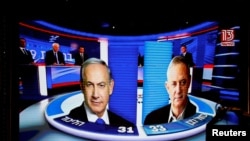After a week of political gridlock, and one politically-charged year, Israel appears to have avoided its third election now that President Reuvin Rivlin has announced both sides have taken significant steps toward forming a unity government.
Rivlin’s role is largely ceremonial, but he has been thrust into the spotlight to choose which contender will first get to form a government. He has fiercely advocated for a unity government between Benny Gantz’s centrist Blue and White party and Benjamin Netanyahu’s right-wing Likud. And last night, he just might have succeeded in letting the two leaders work it out for themselves.
In order to form a government, a party must win at least 61 seats to get a majority. Typically, as there are numerous parties, Israel has a coalition government. However, neither Gantz nor Netanyahu have been able to cobble enough parties together.
This election has been centered on two hot button issues: security, and the divide between religion and the state.
On security issues, observers say Netanyahu and Gantz are not that different. Palestinian Authority Prime Minister Mohammed Stayyeh described them as “the difference between Coke and Pepsi.” Both have advocated for a hardline against Hamas in Gaza, and have declared that the Jordan Valley along the border between the West Bank and Jordan must remain under Israeli control. Israeli citizens have largely sustained economic stability and strong homeland security under Netanyahu’s tenure.
However, the candidates starkly contrast on the issue of just how much influence religion should yield in government, business, schools, and even romance.
Ultra-orthodox backing
Ultra-Orthodox parties have historically been necessary to form coalition governments. The group does not serve in the military and receives government financial aid to study Torah full-time, opting out of work to pray. Secular Israelis argue they are not contributing their part to society, and the ultra-orthodox argue their faith serves the nation through pleasing God with their piety.
The group's demands are often met, and Netanyahu is no exception to this rule. His campaign almost requires the religious conservative ultra-Orthodox parties’ backing to serve yet another term in office. Another requirement of ultra-orthodox backing is their power over Israeli marriage practices. Jewish Israelis cannot legally marry in Israel outside of the Jewish faith. However, secular marriages performed abroad are recognized.
Arab parties
Gantz supports a secular “liberal” government, which would exclude the ultra-orthodox from the coalition. He has mentioned his interest to media outlets about forming a unity government, and hastening the election process in the meanwhile. Gantz stated that a “paralyzed national government does not benefit the people.”
Meanwhile, no Arab party has ever joined an Israeli government in history, but that did not stop Arabs Israeli citizens from showing up at the polls.
The Joint List scored third after Gantz and Netanyahu’s parties with 13 seats. Party leader Ayman Odeh reports that his supporters showed up at the polls exclusively to vote out Netanyahu stating “We want to put an end to the Netanyahu era. . . There is no shared future without full and equal participation of Arab Palestinian citizens.”
The question now is whether or not the Arab parties will be invited to join in Gantz and Netanyahu’s unity government, and be viewed as legitimate partners to shape the national agenda.
U.S. relations
The United States is watching political developments in Israel closely, to see what impact it could have on relations and issues in the region.
VOA reached out Iran-Israel expert Henry Rome with Eurasia Group for comment and analysis.
He assessed that for U.S.-Israel relations, “The ties are institutional and historical, and endure even if the two leaders do not get along. As Prime Minister, Gantz would likely emphasize, much more than Netanyahu, the importance of a bipartisan relationship with the United States.”
Support within the U.S. for a Jewish state comes from the small American Jewish community (~2% of the population), and the much larger evangelical right-wing base that politically backs U.S. President Donald Trump. However, amongst liberal Democrats, support for Israel has waned amidst partisan lines deepening in the US. General Gantz is more likely than Netanyahu to reach out specifically to Democrats and be cautious to steer clear of partisan battles in Congress.
Rome also noted that Gantz would feel equally as strong against US diplomatic relations with Iran; however, he would certainly be less likely than Netanyahu to publicly engage in speaking caustically against sitting US presidents or Iranian threats.
One thing is for sure: whether or not Netanyahu manages to cling on as prime minister in his possibly new rotating role, little will likely change in the U.S.-Israel relationship.
Since coming into office in January 2017, the White House has been working towards an Israel-Palestinian peace plan. Middle East Envoy Jason Greenblatt tweeted on August 28, 2019 that “We have decided that we will not be releasing the peace vision (or parts of it) prior to the Israeli election.” If Israel’s Arab population felt involved in a Gantz government, then Trump’s Palestinian-Israeli peace plan would have a greater chance of being treated seriously by Palestinian leaders.







